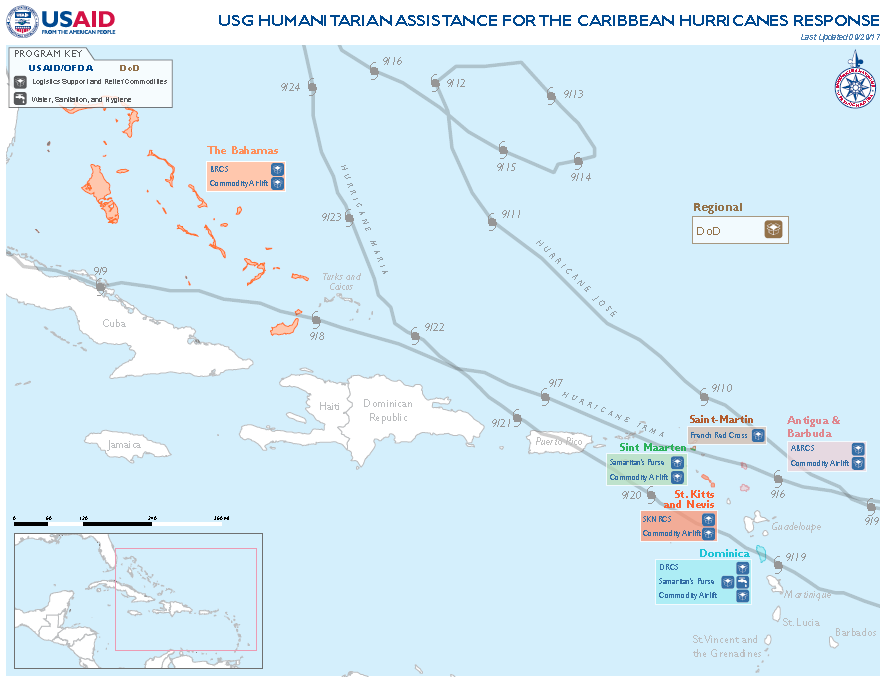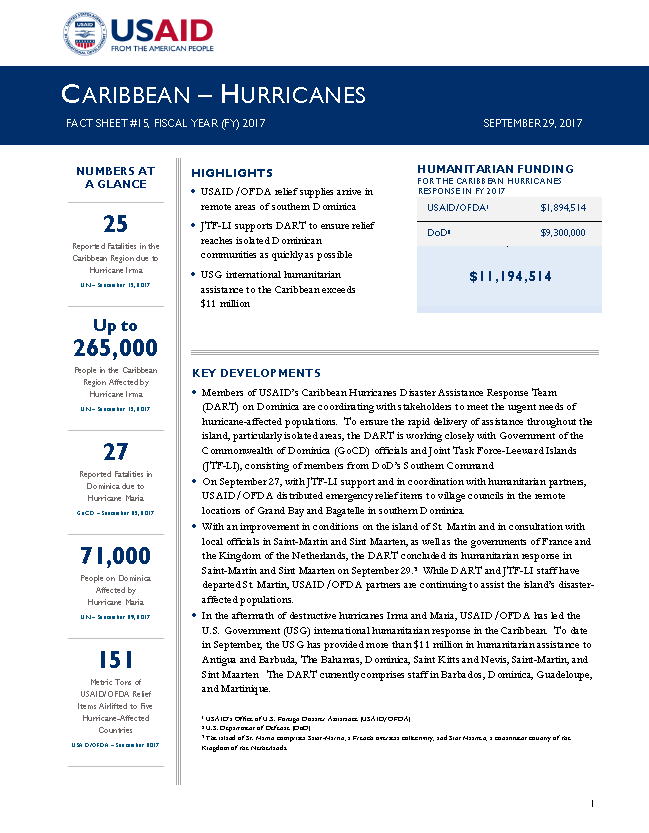September 29, 2017
Highlights
- USAID/OFDA relief supplies arrive in remote areas of southern Dominica.
- JTF-LI supports DART to ensure relief reaches isolated Dominican communities as quickly as possible.
- USG international humanitarian assistance to the Caribbean exceeds $11 million.
Key Developments
Caribbean Hurricanes - Map #15 ![]() (pdf - 491k)
(pdf - 491k)
Numbers At A Glance
25
Up to 265,000
27
71,000
151
Humanitarian Funding
For the Caribbean Hurricanes Response in FY 2017
| USAID/OFDA | $1,894,514 |
| DoD | $9,300,000 |
| Total | $11,194,514 |
Caribbean Hurricanes - Fact Sheet #15 ![]() (pdf - 221k)
(pdf - 221k)
Members of USAID’s Caribbean Hurricanes Disaster Assistance Response Team (DART) on Dominica are coordinating with stakeholders to meet the urgent needs of hurricane-affected populations. To ensure the rapid delivery of assistance throughout the island, particularly isolated areas, the DART is working closely with Government of the Commonwealth of Dominica (GoCD) officials and Joint Task Force-Leeward Islands (JTF-LI), consisting of members from DoD’s Southern Command.
On September 27, with JTF-LI support and in coordination with humanitarian partners, USAID/OFDA distributed emergency relief items to village councils in the remote locations of Grand Bay and Bagatelle in southern Dominica.
With an improvement in conditions on the island of St. Martin and in consultation with local officials in Saint-Martin and Sint Maarten, as well as the governments of France and the Kingdom of the Netherlands, the DART concluded its humanitarian response in Saint-Martin and Sint Maarten on September 29.3 While DART and JTF-LI staff have departed St. Martin, USAID/OFDA partners are continuing to assist the island’s disaster-affected populations.
In the aftermath of destructive hurricanes Irma and Maria, USAID/OFDA has led the U.S. Government (USG) international humanitarian response in the Caribbean. To date in September, the USG has provided more than $11 million in humanitarian assistance to Antigua and Barbuda, The Bahamas, Dominica, Saint Kitts and Nevis, Saint-Martin, and Sint Maarten. The DART currently comprises staff in Barbados, Dominica, Guadeloupe, and Martinique.
DOMINICA
DART staff are coordinating with the GoCD and relief organizations to meet the urgent needs of hurricane-affected populations on Dominica. The DART is focusing on several priorities, including food assistance, shelter support, and water, sanitation and hygiene (WASH) interventions, as well as humanitarian coordination and logistics.
Food Security
DART staff continue to evaluate food security conditions on Dominica. Many communities and shelters have reported diminishing food stocks, and most people are likely rationing remaining food supplies, according to the DART. Most markets remain closed due to supply chain disruptions resulting from ongoing transportation constraints, leaving residents unable to replenish food stocks even if they have access and funds. Furthermore, Hurricane Maria destroyed crops and agricultural infrastructure across the island.
On September 29, the UN World Food Program (WFP) reports having delivered 10 metric tons (MT) of high-energy biscuits (HEBs) to Dominica from its pre-positioned stocks in Antigua; WFP plans to contribute additional HEBs toward the response. Since September 25, in accordance with a GoCD distribution plan, WFP has been delivering the HEBs, along with water and other relief items, to communities in need via helicopter and boat. Overall, WFP plans to provide food assistance to approximately 25,000 people on Dominica for three months.
Humanitarian Coordination and Logistics
To facilitate the rapid delivery of assistance throughout Dominica, the DART has requested the unique capabilities of DoD through JTF-LI to transport relief items to isolated communities. On September 27, with DoD support, USAID/OFDA provided emergency relief items to village councils in the southern Dominican communities of Grand Bay and Bagatelle, with populations of approximately 3,000 and 300, respectively. As a result of hurricane-related landslides and bridge damage, Grand Bay is completely isolated, and neither location has telecommunications services. The USAID/OFDA assistance—delivered in coordination with the Dominica Red Cross Society (DRCS) and the International Federation of Red Cross and Red Crescent Societies—included blankets, hygiene kits, kitchen sets, and water containers.
The DART is maintaining close contact with the GoCD, the Caribbean Disaster Emergency Management Agency (CDEMA), UN agencies, relief organizations, other donors, and other humanitarian stakeholders on the island to ensure a coordinated response. The DART has also stationed several staff in Barbados, where CDEMA has established a coordination cell.
Shelter
Based on initial assessments, the DART’s shelter and settlements technical advisor reports a critical need for roofing materials on Dominica, noting that most houses and other buildings remain habitable but require roof repairs.
On September 26 and 27, USAID/OFDA transported a combined 400 rolls of plastic sheeting from USAID/OFDA stockpiles in Miami, Florida, to Dominica. The plastic sheeting is expected to allow up to 20,000 hurricane-affected people to commence shelter repairs.
WASH
On September 27, the Dominica Water and Sewerage Company Limited (DOWASCO) repaired a local water system in the capital of Roseau and disinfected the water treatment plant, restoring piped water services to the city’s main hospital, according to the DART. DOWASCO continues to work towards the restoration of water services in all neighborhoods in Roseau.
The DART’s WASH technical advisor and other humanitarian actors continue working to increase access to safe drinking water for residents of Dominica. Through $200,000 in funding to Samaritan’s Purse, USAID/OFDA aims to support more than 14,300 people with WASH assistance. Samaritan’s Purse plans to procure and install four water filtration and chlorination units at six to eight springs to improve the availability of safe water for drinking and cooking. The organization will also distribute 20-liter water containers and conduct hygiene promotion sessions for beneficiaries.
ST. MARTIN
After the passage of Hurricane Irma, USAID and DoD provided humanitarian assistance on the island of St. Martin to complement relief activities led by local officials in Saint-Martin and Sint Maarten, as well as the governments of France and the Kingdom of the Netherlands. As conditions on St. Martin improved and in consultation with host authorities, the DART concluded its humanitarian response in Saint-Martin and Sint Maarten on September 29.
On September 28, JTF-LI conducted a final day of water distribution at two sites in Saint-Martin’s Orient Bay and Sandy Ground communities. In coordination with French and Saint-Martin authorities and at the request of the DART, JTF-LI established and operated eight lightweight desalination units to address the collectivity’s need for potable water in the aftermath of Hurricane Irma. Between September 15 and 27, the two water-production sites generated approximately 83,020 gallons, or 314,260 liters, of water for household use.
While the DART and JTF-LI have departed St. Martin, USAID/OFDA partners are continuing to assist hurricane-affected populations in Saint-Martin and Sint Maarten. Prior to the departure of the USG-provided desalination units, USAID/OFDA partner the French Red Cross installed water storage tanks in Orient Bay and Sandy Ground. The organization plans to refill the tanks by water trucking to continue meeting community water needs.
The DART reports that the French Red Cross, in coordination with local authorities, is also continuing to conduct humanitarian distributions and information campaigns in six fixed locations and via six mobile teams in the French overseas collectivity. In addition, with $100,000 in USAID/OFDA funding, the organization is procuring and distributing water containers to Saint-Martin households.
In Sint Maarten, USAID/OFDA has provided 100 rolls of plastic sheeting to the local government to assist up to 5,000 people with emergency shelter support needs. In addition, USAID/OFDA has contributed $100,000 to Samaritan’s Purse to provide water containers to disaster-affected households in Sint Maarten. As of September 26, the organization had distributed more than 3,600 water containers to Sint Maarten residents.
INTERNATIONAL RESPONSE
On September 29, the UN launched a three-month Dominica Flash Appeal, developed in collaboration with the GoCD, CDEMA, UN agencies, and local and international relief organizations working on Dominica. The plan requests $31.1 million to address the humanitarian needs of an estimated 65,000 hurricane-affected people on the island between September and December 2017. Funding requirements include $6 million for food security interventions to reach 10,000 households and $5.1 million for WASH activities to reach 54,000 people.
CONTEXT
During successive weeks in September, hurricanes Irma, Jose, and Maria tracked through the Caribbean. The storms, particularly Irma and Maria, brought destructive winds, heavy rainfall, and dangerous storm surge to affected islands, leading to at least 52 fatalities and causing significant infrastructure damage across the region.
On September 6, U.S. Chargé d’Affaires, a.i., Lisa A. Johnson issued a disaster declaration in response to the anticipated effects of Hurricane Irma in The Bahamas, and on September 7, U.S. Ambassador to Barbados and the Eastern Caribbean Linda S. Taglialatela issued a disaster declaration in response to Hurricane Irma and the anticipated effects of Hurricane Jose in Antigua and Barbuda. In response, USAID/OFDA contributed an initial $100,000 each to the Bahamas Red Cross Society and the Antigua and Barbuda Red Cross Society.
On September 7, USAID activated a regional DART and stood up a Washington, D.C.-based Response Management Team to coordinate the USG’s humanitarian response to the hurricanes.
On September 9, U.S. Embassy in Paris Chargé d’Affaires D. Brent Hardt issued a disaster declaration for French Saint-Martin, and on September 10, U.S. Embassy in The Hague Chargé d’Affaires Shawn Crowley declared a disaster for Sint Maarten due to the effects of Hurricane Irma and anticipated effects of Hurricane Jose. In response, USAID/OFDA contributed an initial $100,000 each for activities in Saint-Martin and Sint Maarten.
Following the passage of Hurricane Maria, Ambassador Taglialatela issued disaster declarations for Dominica and Saint Kitts and Nevis due to the storm impacts. In response, USAID/OFDA provided an initial $100,000 to Dominica and $50,000 to Saint Kitts and Nevis to address priority needs.
PUBLIC DONATION INFORMATION
The most effective way people can assist relief efforts is by making cash contributions to humanitarian organizations that are conducting relief operations. A list of humanitarian organizations that are accepting cash donations for disaster responses around the world can be found at www.interaction.org.
USAID encourages cash donations because they allow aid professionals to procure the exact items needed (often in the affected region); reduce the burden on scarce resources (such as transportation routes, staff time, and warehouse space); can be transferred very quickly and without transportation costs; support the economy of the disaster-stricken region; and ensure culturally, dietary, and environmentally appropriate assistance.
More information can be found at: USAID Center for International Disaster Information: www.cidi.org or +1.202.661.7710. Information on relief activities of the humanitarian community can be found at www.reliefweb.int.









Comment
Make a general inquiry or suggest an improvement.